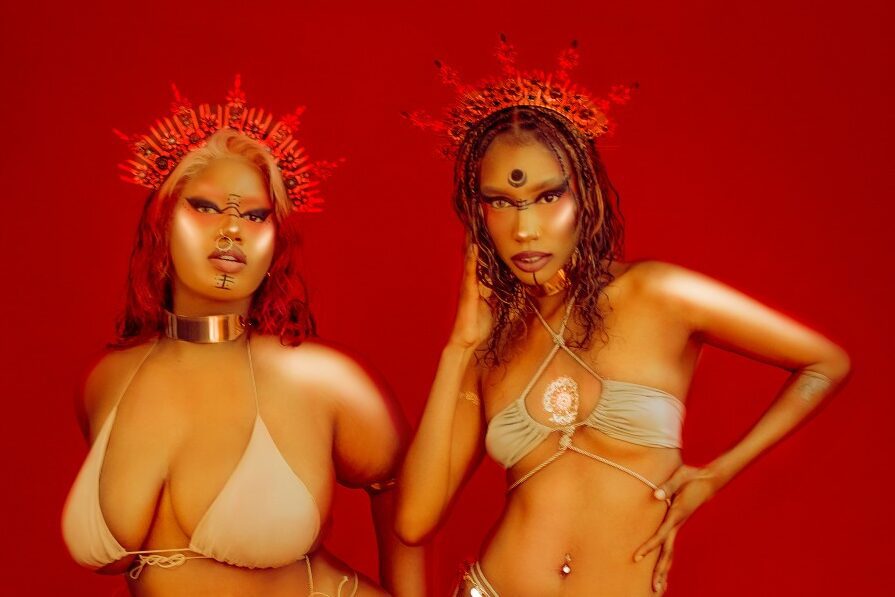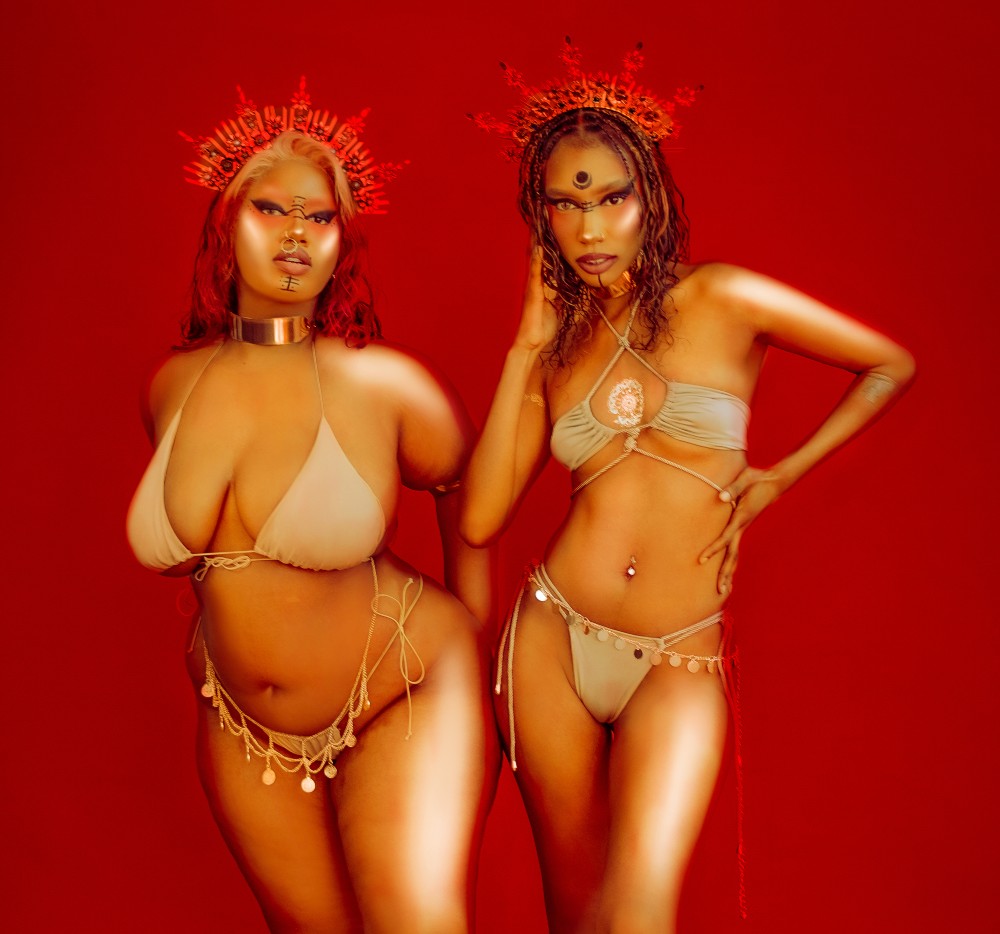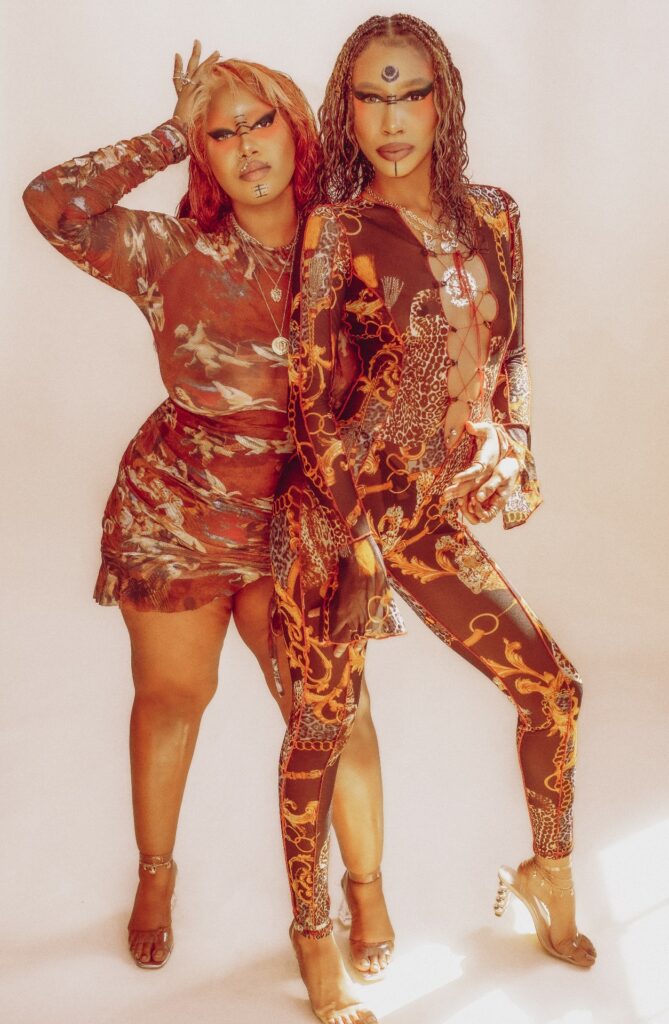

Bebi Monsuta are one of the most exciting and fresh emerging acts to rise from New York City’s cross-genre hip hop scene. Blood sisters Manami and Akira share a kinetic bond, an intrinsic psychic connection embodying strength, vulnerability, and grace as they pay homage to their melting pot heritage. The literal translation of Bebi Monsuta (“ヘヒ モンスタ”) is “baby monster” and highlights the duo’s Japanese ancestry on their maternal side, while their newest bi-lingual single “Deuses Falsos” – premiering via Audiofemme – references their Portuguese-Brazilian roots.
Produced by Xavi (Ariana Grande, Megan Thee Stallion, Flo Milli), the track weaves together elements of Brazilian funk and recalls the sisters’ coming of age experiences in life and music. We met up at Japanese ice cream shop Taiyaki NYC on Baxter street; as we inhaled mochi and vanilla heaven, we made our way over to the Elizabeth Street sculpture garden to get better acquainted and dive deeper into their musical project.
Akira explains, “We named the song ‘Deuses Falsos’ (False Gods) because a God has foresight to know when something is great in the making even though it sometimes takes numbers to see that in this world.” Manami adds, “The song is intended to motivate people that have been in a place of feeling unseen for who you are, and your talents. Yes, we are broke girls, but this talent is rich AF.”
It won’t be long before the world recognizes those talents, too. Though “Deuses Falsos” is only Bebi Monsuta’s fourth single (they debuted with ABRONCA collab “Brazilian Sound” in 2019), they’re about to drop their first EP on November 11 via +1 Records. Titled 11.11, the EP draws numerological reference to synchronicity and cosmic enlightenment, representing a time when our consciousness may be uniquely open to the universe.
Sonically, the alternative R&B duo pulls inspiration from Vanity 6, Gwen Stefani, and Brazilian Funk. They’re self proclaimed music-makers for the outcasts, nerds, nomads, the condemned, the abandoned, and all those who don’t quite fit into society. Taking stylistic influence from graphic novels, comic books, and drag culture – these sisters are a sonic and visual force to be reckoned with.
Their fiercely confident breakout singles “RäkStär” and “808” are high-energy empowering anthems of self love and living a life guided by the power of intuition. The tracks are deeply infused with Afro-American and Caribbean beats; “RäkStär” plays with ancient wisdom and extraterrestrial clairvoyance, departing from “the generic ‘rockstar’ aesthetic” in favor of “someone aligned with astrology, crystals, stars and planets.” They wear white contacts in the Purty Pat-directed video to reference the idea of expanding deeper into the consciousness. Reflecting empowerment and tapping into the divine through fierce improvisational dance moves, Bebi Monsuta embody an ethereal, all-knowing feminine agency.
“We definitely put a lot of intention behind our music. Whenever we go into the studio to record a song, we always think about first and foremost, how it’s going to make people feel, and affect their lives,” Akira expresses. “Even in the song ‘RäkStär,’ it’s very much about outcasts, being afraid that this person’s family might not accept you. There are hidden elements that relate to people and their deepest vulnerabilities. I think that’s the first place that healing takes place, you know, tapping into those instincts.”
Manami takes a moment to pause and analyze the duality of being a recording artist. “Something that a lot of people don’t understand about being in music, yes it’s glitz, and glam, it’s about the hair, the makeup, and the costuming. And we do approach our project like drag. We visually step into and embody a whole new person,” she says. “It’s because we grew up on comic books and video games. Our dad read us comic books to bed, and we played a lot of video games. Beyond the costumes, the most important thing to us is being relatable. It’s common people only see the façade. They don’t know that you come back home, and you may have other deeper issues, and problems. We just want to craft this new celebrity that really talks to people about real things going on in your life.”
Akira adds that they think of their audience like they would their closest friends, and their songs represent the intimate and real conversations they might have together. “Our last show at Elsewhere, Manami opened up about her eating disorder on stage. She felt safe and comfortable with talking about it, and so many people in the audience could relate on that level of vulnerability. There wasn’t a person that hugged us after the performance who wasn’t in tears,” she remembers; the duo had been performing their song “Me Yamu,” about self love. “That meant a lot to us, because it was our intention. We wanted to create a safe space for our audience to really connect with us.”
Manami adds, “I’m not afraid to talk about it anymore. I was naturally a very slim child and then I developed Hypothyroidism through diet. It caused me depression and extreme mood swings. Self-healing, meditation, and music has really helped me.”

The sisters are also interested in epigenetics, the study and awareness of how your behaviors and environment can affect how your genes work. A recent Instagram post detailed the power and the pain that have been passed onto them via their ancestors; during our conversation Manami insists that the best thing one can pass down through family lineage can be a “light-hearted spirit, and peaceful and loving genetics.” The sisters shared anecdotes of their hyper-intuitive grandmother, an empath and a healer. They take tremendous influence from her ability to tap into her inner world for self-reflective wisdom.
“We want people to feel motivated and worthy. We want those who listen to this project to feel that the truth is and will always be better than a lie. Stand in it, own it and be brave,” they say.
That’s something they put into every performance, too. Manami explains their traditions of a pre-show mindfulness meditation. “We take a little shot, we smoke a little bit, and then we just try to connect with the audience, because through song is the best way we know how,” she says.
Bebi Monsuta’s music may sound like turn up songs simply meant to get a party going, and they certainly achieve that. But don’t be fooled – they’re also deeply rooted in personal experiences. “We look out in the crowd, we see the expressions on people’s faces and let our hearts and souls speak. We don’t know why we’re here on this planet, or what the earth is actually about, but the best thing you can do is love each other.”
Follow Bebi Monsuta on Instagram for ongoing updates.




